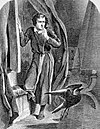"The Raven" is a narrative poem by American writer and poet Edgar Allan Poe first published in January 1845. Noted for its musicality, stylized language and supernatural atmosphere, it tells of a talking raven's mysterious visit to a distraught lover, tracing his slow descent into madness. The lover, often identified as a student, is lamenting the loss of his love, Lenore. The raven, sitting on a bust of Pallas, seems to further instigate his distress with its repeated word, "Nevermore." Throughout, Poe makes allusions to folklore and various classical works. Poe claimed to have written the poem very logically and methodically. His intention was to create a poem that would appeal to both critical and popular tastes, as he explains in a follow-up essay, "The Philosophy of Composition". The poem was inspired in part by a talking raven in the novel Barnaby Rudge: A Tale of the Riots of 'Eighty by Charles Dickens. The first publication of "The Raven" on January 29, 1845 in the New York Evening Mirror made Poe widely popular in his day. The poem was soon heavily reprinted, parodied, and illustrated. Though some critics disagree about the value of the poem, it remains one of the most famous poems ever written. (more...)
Recently featured: Charles Edward Magoon – California Condor – Branded to Kill
